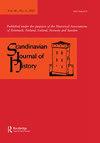The policing of alcoholics: Power and resistance in early welfare-state Sweden
IF 0.8
3区 历史学
Q1 HISTORY
引用次数: 0
Abstract
ABSTRACT What in this article is called ‘the policing of alcoholics’ was a process involving several agents and institutional bodies, including but not limited to, officials and at the alcoholics’ institutions, regional and local temperance boards, police authorities and local poor-law boards as well and several others. For the welfare state in the making, the recalcitrant and morally depraved alcoholic represented an anomaly, someone who did not really belong to society. Policing was in the last instance legitimated by the role it played in the process of creating a new social order. The early welfare state should not mainly be seen as a form of ‘liberal’ governance but as a state formation where a continuity with older forms of governance, i. e. policing, existed. The empirical material for this article is taken from the alcoholics’ institution at Svartsjö in the late 1930s and early 1940s. By being subjected to the workings of the power apparatuses in institutions like these, an undifferentiated mass of vagrants, beggars, drunkards, petty criminals, and unruly and socially troublesome people were transformed into a new welfare category, the alcohol abusers. Importantly, this was a process to which the alcohol abusers, through their resistance, also contributed.对酗酒者的监管:早期福利国家瑞典的权力与反抗
摘要本文中所称的“酗酒者治安”是一个涉及多个代理人和机构的过程,包括但不限于官员和酗酒者机构、地区和地方禁酒委员会、警察当局和地方贫困法律委员会以及其他几个机构。对于正在形成的福利国家来说,这个顽固不化、道德败坏的酒鬼代表了一种反常现象,一个并不真正属于社会的人。警务在创建新社会秩序的过程中所起的作用最终使其合法化。早期的福利国家不应主要被视为一种“自由主义”治理形式,而应被视为与旧的治理形式(即治安)相连续的国家形式。本文的实证材料取自20世纪30年代末和40年代初Svartsjö的酗酒者机构。通过在这样的机构中接受权力机构的运作,一群无差别的流浪者、乞丐、酒鬼、小罪犯以及不守规矩和社会麻烦的人被转变为一个新的福利类别,即酗酒者。重要的是,这是一个酗酒者通过抵抗也做出贡献的过程。
本文章由计算机程序翻译,如有差异,请以英文原文为准。
求助全文
约1分钟内获得全文
求助全文
来源期刊

SCANDINAVIAN JOURNAL OF HISTORY
HISTORY-
CiteScore
1.10
自引率
20.00%
发文量
33
期刊介绍:
Scandinavian Journal of History presents articles on Scandinavian history and review essays surveying themes in recent Scandinavian historical research. It concentrates on perspectives of national historical particularities and important long-term and short-term developments. The editorial policy gives particular priority to Scandinavian topics and to efforts of placing Scandinavian developments into a larger context. Studies explicitly comparing Scandinavian processes and phenomena to those in other parts of the world are therefore regarded as particularly important. In addition to publishing articles and review essays, the journal includes short book reviews. Review essay proposals and polemical communications are welcomed.
 求助内容:
求助内容: 应助结果提醒方式:
应助结果提醒方式:


